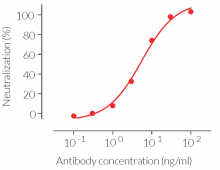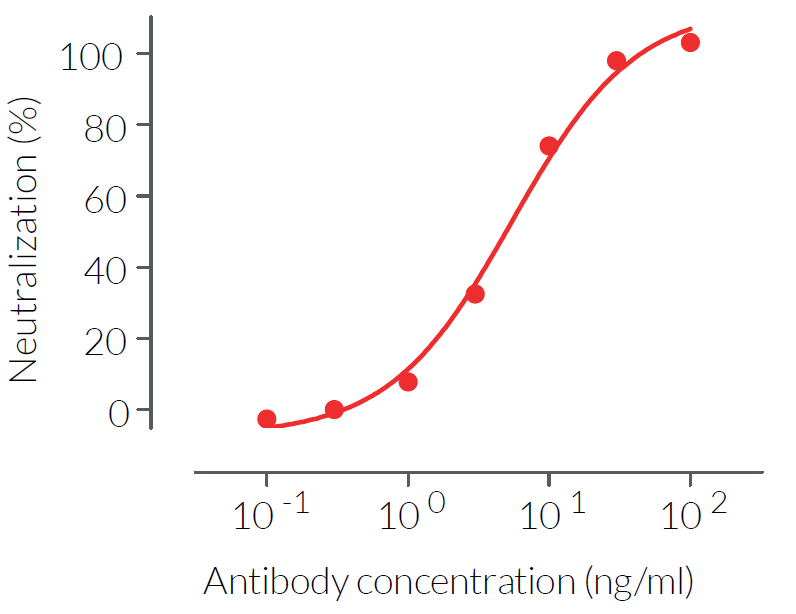Anti-TNF-α (Adalimumab biosimilar - IgG4 isotype)
| Product | Unit size | Cat. code | Docs. | Price | |
|---|---|---|---|---|---|
|
Anti-hTNF-α-hIgG4 Human TNF-α (Adalimumab) antibody - Human IgG4 |
Show product |
100 µg 3 x 100 µg |
htnfa-mab4
|
Human IgG4 monoclonal antibody (mAb) against human TNF-α

Neutralizing monoclonal antibody against human TNF-α
Anti-hTNF-α-hIgG4 is a neutralizing monoclonal antibody (mAb) featuring the constant region of the human IgG4 (hIgG4) isotype and the variable region of adalimumab, a fully human therapeutic mAb that targets human tumor necrosis factor-alpha (hTNF-α). The variable region of adalimumab blocks the interaction of soluble and membrane-bound TNF-α with its receptors TFNR1 and TNFR2, thereby downregulating the inflammatory responses [1,2].
Anti-hTNF-α-hIgG4 was generated by recombinant DNA technology. It is produced in CHO cells and purified by affinity chromatography with protein G. The neutralizing activity of Anti-hTNF-α-hIgG4 was determined using recombinant human TNF-α and HEK-Blue™ TNF-α cells. TNF-α is a pleiotropic cytokine that notably induces NF-κB-mediated production of pro-inflammatory cytokines [1,2].
Human IgG4 Isotype:
The human IgG4 isotype displays low to no potency for Fc-mediated antibody-dependent cellular cytotoxicity (ADCC), low potency for antibody-dependent cellular phagocytosis (ADCP), and it does not mediate complement-dependent cytotoxicity (CDC).
![]() Learn more about antibody isotype effector functions by reading our flyer on Clinically relevant monoclonal antibodies.
Learn more about antibody isotype effector functions by reading our flyer on Clinically relevant monoclonal antibodies.
References:
1. Steeland S., et al. 2018. A new venue of TNF targeting. Int. J. Mol. Sci. 19:1442.
2. Shealy D.J. & Visvanathan S. 2008. Anti-TNF antibodies: lessons from the past, roadmap for the future. Therapeutic Antibodies (book). 101-129.
Specifications
ND50 (50% neutralizing dose): ~ 2 - 5 ng/ml for 4 ng/ml human TNF-α in HEK-Blue™ TNF-α cells
Specificity: Human TNF-α (hTNF-α)
Clonality: Monoclonal antibody
Isotype: Human IgG4, kappa
Control: Anti-β-Gal-hIgG4
Source: Chinese hamster ovary (CHO) cells
Purification: Affinity chromatography with protein G
Formulation: 0.2 µm filtered solution in sodium phosphate buffer with glycine, saccharose and stabilizing agents
Tested application: Blocking & Neutralization of hTNF-α signaling.
Quality control:
- Human IgG4 isotype has been confirmed by ELISA.
- The neutralization of hTNF-α signaling pathway has been confirmed using cellular assays with the HEK-Blue™ TNF-α cells.
- The absence of bacterial contamination (e.g. lipoproteins and endotoxins) has been confirmed using HEK-Blue™ TLR2 and HEK-Blue™ TLR4 cells.
Contents
Anti-hTNF-α-hIgG4 purified monoclonal antibody is provided azide-free and lyophilized. It is available in two quantities:
- htnfa-mab4: 100 µg
- htnfa-mab4-03: 3 x 100 µg
![]() Product is shipped at room temperature.
Product is shipped at room temperature.
![]() Upon receipt, store lyophilized antibody at -20 °C.
Upon receipt, store lyophilized antibody at -20 °C.
Back to the top
Details
Tumor necrosis factor-alpha (TNF-α) is a pleiotropic cytokine involved in necrotic and apoptotic cell death, cellular differentiation, inflammation, and regulation of immune cell activity [1]. TNF-α is mainly produced by activated monocytes, macrophages, and T cells. It is first synthesized as a membrane-bound molecule that forms a compact homotrimer through non-covalent interactions. The trimeric membrane-bound form is cleaved by tumor necrosis factor-alpha converting enzyme (TACE) releasing the soluble trimer [2]. Both the membrane-bound and soluble TNF-α bind homotrimeric transmembrane receptors, TNFR1 or TNFR2, triggering signaling pathways that involve TRADD, TRAF2, and RIP, and leading to the activation of NF-κB and MAPK pathways. Importantly, membrane-bound TNF can also mediate a reverse "outside-to-inside" signaling, although this mechanism remains to be fully elucidated [2].
References:
1. Steeland S., et al. 2018. A new venue of TNF targeting. Int. J. Mol. Sci. 19:1442.
2. Shealy D.J. & Visvanathan S. 2008. Anti-TNF antibodies: lessons from the past, roadmap for the future. Therapeutic Antibodies (book). 101-129.





